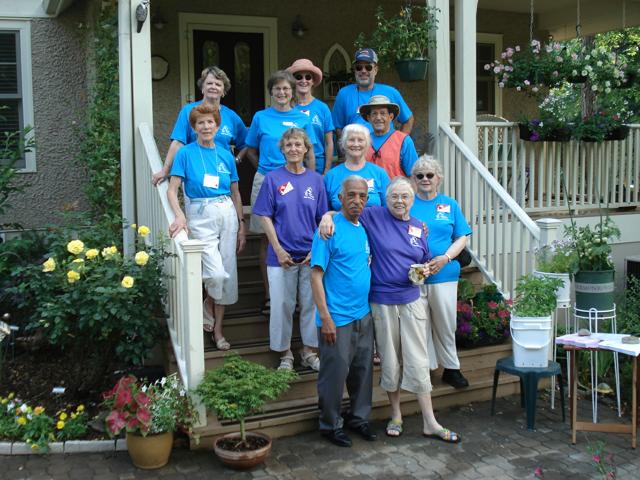At some point, all gardeners find themselves stumped: What the heck is eating my plants? When do I prune my hydrangeas if I ever want them to flower? Master gardeners, the county extension agents’ strong right arm, are the certified experts we turn to when the going gets rough.
Here’s a rundown of the questions these able volunteers are most likely to hear as gardening season hits full bloom, compliments of Extension Agent Linda Blue, who coordinates the Master Gardeners program:
• No. 1: When do I plant/fertilize/transplant/prune/mulch/deadhead my …?
If you're new to gardening and don't know that sweet peas are planted earlier than tomatoes, that's a necessary question. Seed packs say to plant after the last potential frost date, but when is that? Are spring bulbs planted in the spring and summer bulbs in the summer? When are forsythias pruned? Happily, the master gardeners have published The Buncombe County Garden Guide, which gives homeowners a complete garden chore list. It tells you what to do, when to do it — and what not to do. A revised edition is due out soon; look for it at events hosted by the master gardeners (see box).
• No. 2: What's wrong with my plant?
Even nongardeners may eventually have to ask this question. Many a homeowner has wondered why a previously healthy boxwood is now orange instead of green. Or maybe a favorite shade tree is losing its leaves in mid-June. What's wrong?
Only about half the applicants are accepted into the Master Gardeners program; from January through April, this select group spends four hours a week studying basic botany, soils, organics and inorganics, among other subjects, under extension agents’ tutelage. Once trained, they’re prepared to either answer your questions or point you in the right direction. They do ask, however, that you bring in a sample of that bright-orange boxwood or capture one of the pesky bugs in question and stop by the office with it, rather than trying to describe it over the phone. This helps them accurately identify and diagnose the problem.
• No. 3: What about the soil?
This topic is far more complex than anyone other than a soil scientist would suspect. How do I amend my soil? What do I amend it with? What’s my pH? Why don't my plants do well in my soil?
The best way to answer these questions is to get your soil tested. “North Carolina,” notes Blue, “is the only state left that tests your soil at no charge — and for the average gardener, summer is the time to send it off." That’s because farmers send their soils in for testing in fall and winter, so it takes longer to get the results. Plus, summer’s when most homeowners and small-scale gardeners think about their soil. If you do it now, expect a turnaround time of 10 days to two weeks. A master gardener can explain how to send your soil in for testing.
• No. 4: How do I know which plants to choose?
This is a common dilemma for gardeners: I grew up surrounded by gardenias and camellias; can I grow them here? And sometimes, says Blue, such questions can be very specific: I need a plant 4 feet high that grows in shade. What can you recommend?
Master gardeners also hear a lot of questions about fruit trees and shrubs. Will peach trees grow here, or are apple trees a better choice? What about berries? Plant selection is critical; some varieties are disease-resistant, and some need a particular microclimate. Checking in with a master gardener could save you some money.
• No. 5: How do I take care of my lawn?
Lots of specifics here: How do I control the weeds, fertilize my lawn, mow it and keep it green and healthy? Lawn-care workshops always draw a big crowd, so master gardeners know to expect a lot of questions concerning lawns, ground covers and how to minimize watering. (In case you're wondering, keep your grass 3 inches high and don't mow it when it's wet: This leads to disease.)
Master gardeners are chosen based on their availability to volunteer, not their gardening expertise. They’re required to give 40 hours of service between April and December and to take continuing-education classes to maintain their certification; some of these dedicated folks have served more than 20 years. If this program sounds like a good fit for you, contact Blue (see box).
— Cinthia Milner gardens in Leicester.




Before you comment
The comments section is here to provide a platform for civil dialogue on the issues we face together as a local community. Xpress is committed to offering this platform for all voices, but when the tone of the discussion gets nasty or strays off topic, we believe many people choose not to participate. Xpress editors are determined to moderate comments to ensure a constructive interchange is maintained. All comments judged not to be in keeping with the spirit of civil discourse will be removed and repeat violators will be banned. See here for our terms of service. Thank you for being part of this effort to promote respectful discussion.